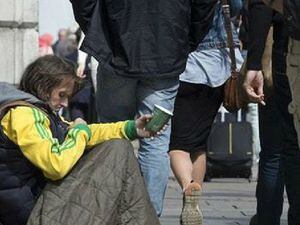Shropshire Star comment: Looking at helping the homeless
Shrewsbury has been in this quandary before.

In the doorways there are some beggars. What is the right thing to do? Let them be and give them money? Or refuse direct aid and try to get them moved on?
Views on what should be done will be coloured by views about the status of the beggars themselves. Some are going to be the visible manifestation of a problem which might otherwise go largely unnoticed by those who have homes to go back to and comfortable beds to sleep in at night.
There are significant numbers of homeless people in Shrewsbury and Shropshire, and it is unhelpful to generalise about them, because they all have their individual circumstances and different stories about how they came to be in that plight.
Beggars may or may not be homeless, and the homeless may or may not be beggars.
It is, though, the most basic quality of humanity to show compassion to those in their hour of need. Moving people on might be seen as something less savoury, an attempt to shuffle them out of sight because their presence is harming the image Shrewsbury wants to project as a pleasant tourist town where all is sweetness and light.
Their treatment would have echoes of that crackdown of a while back on the drunk and anti-social hanging around The Square.
If they are homeless, where are they to be moved on to? That raises all those other questions about how to accommodate the homeless and give them support.
Where levels of sympathy dry up is those cases in which those asking for money are perceived as not suffering hardship at all, and are simply taking advantage of the inherent goodwill of passers-by. For those folk who feel they have been deceived, and the money they have handed over is simply being seen as a bonus amount to be spent in the local boozer rather than to alleviate genuine hardship, they are left with a bitter taste.
They may vow never again to be taken for a mug. The upshot is, as it is virtually impossible to distinguish genuine cases from bogus cases without some sort of investigation, that the genuinely homeless or poverty-stricken lose out.
There are no easy or comfortable solutions. But in its approach Shrewsbury has to be careful not to appear to look down on disadvantaged people with contempt when it could be helping them to their feet.





